
Related
Topics
Guests
- Antonia Juhaszlead author and editor of the True Cost of Chevron report. She’s also the author of Tyranny of Oil: The World’s Most Powerful Industry and What We Must Do to Stop It.
- James CraigMedia adviser for Latin America for Chevron
Now Chevron’s annual report reports that 2008 was the company’s most profitable year in history. Just ahead of Chevron’s shareholder meeting, a new report released today tells shareholders more about the hidden and underreported costs of these profits. The alternative annual report is called “The True Cost of Chevron.” It brings together stories from communities across the world — Angola, Burma, Canada, Chad, Cameroon, Ecuador, Iraq, Kazakhstan, Nigeria, the Philippines and the United States — all directly affected by and in struggle against Chevron’s operations. We speak to the report’s author and James Craig, media adviser for Latin America for Chevron. [includes rush transcript]
Transcript
AMY GOODMAN: We turn now to another oil giant that’s operating in the Niger Delta, as well as around the world: Chevron. Well, ten days into the Nigerian military’s offensive on the oil-rich delta, militants blew up a major Chevron pipeline on Sunday. The Movement for the Emancipation of the Niger Delta, known as MEND, claimed responsibility for the attack.
Chevron said it’s been forced to shut down about 100,000 barrels a day since the attack. In an email message, MEND said it would continues its, quote, “cat and mouse tactics until oil exports cease completely.”
For Chevron, this is just more bad news ahead of the shareholders’ meeting on Wednesday. The attack comes in the midst of a fierce court battle in Ecuador over the polluting of the Amazon that could cost Chevron as much as $27 billion.
Now, Chevron’s annual report, that 2008 was the company’s most profitable year in history.
Just ahead of Chevron’s shareholder meeting, a new report was released today that is telling shareholders more about the hidden and underreported costs of these profits. The alternative annual report is called “The True Cost of Chevron.” It brings together stories from communities across the world — Angola, Burma, Canada, Chad, Cameroon, Ecuador, Iraq, Kazakhstan, Nigeria, the Philippines and the United States — all directly affected by and also in struggle against Chevron’s operations.
Antonia Juhasz is the lead author and editor of the report, available at truecostofchevron.com. She’s also author of Tyranny of Oil: The World’s Most Powerful Industry and What We Must Do to Stop It. She’s joining us from San Francisco.
Antonia, welcome to Democracy Now! Can you lay out your findings in this “True Cost of Chevron,” the alternative annual report that you’ve just released today?
ANTONIA JUHASZ: Yes. Thank you, and good morning.
The most important thing, I think, first to say about the report is that it is a collaborative — unique collaborative effort of local communities all across the United States and the world telling their story of the direct impacts of Chevron’s operations on their communities, on their livelihoods, on their health, and an attempt to unite those struggles against Chevron into one movement and put it all together in one report to let Chevron’s shareholders know that while the case in Ecuador that is about to cost — it looks like Chevron is going to lose that case, a $27 billion liability, has received a significant amount of attention for good reason. It’s not an isolated case, and it’s not an isolated incident of harm caused by the company and communities organizing to ensure that Chevron is held to account.
So, what we uncovered in the report is essentially a consistent theme across Chevron’s operations in the United States and globally of a severe lack of adherence to environmental laws and environmental standards, public health laws, public health standards, particularly abroad, rampant human rights abuses, and aligning itself with some of the most brutal governments and supporting those brutal governments and regimes and their militaries in the world, including using those brutal militaries to protect its operations; also, that Chevron, very much counter to its public relations efforts, is very, very much not refashioning itself as a clean-energy company, but rather is moving even more aggressively now into some of the most environmentally destructive modes of production that we’ve come up with: tar sand production in Alberta, shale production in the Midwest, offshore drilling. Chevron also has a coal company. It also has a chemical company. It’s also engaging in even more environmentally destructive modes of production, while making, at best, token investments in green alternative energy.
And then, what our report attempts to do is, again, to demonstrate that there is a cost associated with this — these methods of production. And those costs are communities organizing, organizing against those actions, and holding the company to account, financially to account, in the case of lawsuits, in the case of organized boycotts, in the case of demanding that the company spend its money not on its image but on actually cleaning up its act and its practices.
AMY GOODMAN: You begin this alternative annual report by looking at some of the people involved with lobbying on Chevron’s behalf and some of the leadership within Chevron that directly relates to some people who are in the news today. Can you go through some of who these figures are, beginning with William J. Haynes?
ANTONIA JUHASZ: I’d say William Haynes is particularly important. He was the chief counsel, the chief civilian counsel at the Pentagon under the Bush administration, now hired in 2008 to become chief counsel for Chevron. Haynes is currently being investigated both by the US Senate and a Spanish court that may launch criminal charges against him for his involvement in the so-called torture memos, that Haynes personally wrote or oversaw the decision to use harsh techniques on prisoners in Guantanamo and in Iraq.
There was a letter, actually, when Haynes was being considered by the Bush administration for a judgeship, from twenty US military leaders against that appointment, saying that in those memos Haynes actually advocated the use of dogs to intimidate suspects, that the appointment of Haynes as the chief counsel at Chevron, given that Chevron is facing these mass human rights abuse challenges in Burma, in Nigeria, the environmental degradation and human rights consequences of that, in Ecuador, also public health challenges in the Philippines and in Kazakhstan, is quite daunting and quite disturbing for those who are involved in those cases to see, you know, what type of justices that Chevron is bringing to the fore. And there has been many, many calls to demand that Haynes be fired from Chevron and not be given that position while he’s under investigation for those memos.
Another interesting former Chevron board member, who was on Chevron’s board prior to his appointment into the Obama administration, is General James Jones, who not only is now the head of the NSC, but while he was on Chevron’s board had also spent two years as the head of the Chamber of Commerce 21st Century Energy program. And that was the Chamber of Commerce, essentially the largest business lobby group in the country’s efforts to directly challenge legislation to address climate change and to aggressively advocate the agenda of the oil industry for lifting the moratoriums on offshore drilling, for increased shale development, and other domestic — domestic efforts for the oil industry, but also to try and link more directly US foreign policy with our energy policy. And he’s now, as I said, the head of the Obama administration’s National Security Council. Those are just two key — key examples.
AMY GOODMAN: You also talk about lobbyist J. Steven Griles.
ANTONIA JUHASZ: And I’m afraid I’ve lost the sound in my feed.
AMY GOODMAN: Can you hear me? Can you hear me now?
ANTONIA JUHASZ: And so, can’t hear if you’re talking to me.
AMY GOODMAN: Maybe we can get a cell phone up to your ear. We’re going to try to get a cell phone up to your ear.
ANTONIA JUHASZ: There, I can hear you now, Amy.
AMY GOODMAN: You can hear me now? You also refer to —-
ANTONIA JUHASZ: Yes, I can.
AMY GOODMAN: —- J. Steven Griles, current convict. You write, as a headline, “ex-Chevron lobbyist.”
ANTONIA JUHASZ: Yeah, Steven Griles was this number two at the Interior Department under the Bush administration. His tenure at Interior was described by the inspector general who investigated him as, quote, “an ethical quagmire.” He was probably the best example of an individual who was, while in office in the Bush administration, doing everything he could on behalf of his former oil industry clients. Griles became very much embroiled within the Jack Abramoff scandal, is now imprisoned for his role in that scandal.
And he was — in at least two instances worked for Chevron: one, lobbying on behalf of Chevron’s merger with Texaco, and in another, as a witness within a very significant case of Chevron and other companies being charged with, and then settling those charges, of essentially not paying up on the dues that they owed to states and the federal government for offshore drilling.
Now, all these offshore drilling crimes, that one included and many others that we describe within the report, are very important for the public to understand. As Chevron and the oil industry right now tries to lobby to say how clean and safe and good for the economy offshore drilling could be, we have that instance of them not paying their dues. The other instance we have is in Alaska, where there’s a current lawsuit against Chevron for dumping mass amounts of toxins and other pollutants into Alaska’s Cook Inlet as part of its ongoing offshore drilling operations there, again, another lawsuit challenging Chevron’s operations and potentially its bottom line.
AMY GOODMAN: I want to turn now to Ecuador. In a moment, we’re going to be joined by the media adviser for Latin America for Chevron, James Craig. But from your perspective, Antonia Juhasz, can you lay out what the issue is with Chevron in Ecuador?
ANTONIA JUHASZ: Well, this is — there’s two instances. There’s two examples to focus on here. One is the extremity of the case, which is, for the thirty years that Texaco operated in Ecuador, its blatant and chosen disregard for environmental laws and environmental standards that created what’s called a Chernobyl in the Amazon of a massive oil dumping oil spill that continues to pollute, cause mass health problems, cancer, miscarriages, and has destroyed essentially the Amazonian jungle in Ecuador. And Texaco, which was then purchased by Chevron’s unwillingness to come clean and clean up its mess and pay for the damages and the health effects and the livelihood effects of the community, that judgment has now, as we’ve said, come up to potentially a $27 billion judgment.
But this is also the story of a long-term successful organizing by the Ecuadorians, supported by Americans, supported by a global movement, to ensure that this case, which was initially launched in 1993 in the United States, then moved to Ecuador, would continue to receive support and attention and be heard and continue to be fought, because as we see all around the world, the case in Ecuador is not isolated and that each of these communities is following a similar model, organizing, sustaining that organizing in the local community, needing support here, needing a voice here, to see that they, too, can carry their case all the way through against this enormous financial behemoth which is Chevron. And now it does look like, even though Chevron has consistently misled its own shareholders on this point, that the Ecuadorian judge is going to rule as early as this fall against Chevron and require a $27 billion cleanup.
AMY GOODMAN: We’re talking to Antonia Juhasz, who has issued an alternative report called “The True Cost of Chevron” ahead of Wednesday’s Chevron shareholder meeting.
We’re going to turn now to James Craig, media adviser for Latin America for Chevron. He doesn’t want to debate Antonia, but wants to lay out Chevron’s case.
Welcome to Democracy Now!, James Craig. I wanted to get your response to the New York Attorney General Andrew Cuomo opening an investigation of Chevron to determine if it is misleading shareholders about the financial risks the company faces in Ecuador.
JAMES CRAIG: Well, thanks, first of all, for having me on the program.
And, you know, I guess in response to that, the issue of Andrew Cuomo, I could say that, you know, the company is in the process of responding to his letter. Unfortunately, it seems Mr. Cuomo was misled by a group of US trial lawyers.
But first, let me discuss really what our position is with regard to the court case in Ecuador, if that’s OK.
AMY GOODMAN: Yes, but just that issue of how you think that Andrew Cuomo was misled when it comes to Chevron revealing to its shareholders the risk that it faces in Ecuador, the financial risk, because of this case being brought against Chevron for its environmental practices in Ecuador?
JAMES CRAIG: Well, Chevron has disclosed for years in its annual reports and in its filings with the SEC exactly its position on the case in Ecuador. It’s not — the case in Ecuador is not a secret to anyone. It’s widely debated and discussed in the public sphere. The shareholders are aware of it. They’ve been made aware of it. The SEC has been made aware of it. So, I mean, there is no issue here with regard to the company not disclosing anything.
The judicial proceedings in Ecuador, just so as you understand, is a farce. And unfortunately, this is not about the welfare of the Ecuadorian people or the environment. What it is is it’s an attempted shakedown of a US company by a group of US trial lawyers who are colluding with the Ecuadorian government and who are seeking to enrich themselves at the expense of, really, hundreds of thousands of American workers, teachers, nurses, firefighters, whose savings are invested in Chevron through pension funds and 401(k)s. So what we’re dealing with here is a massive attempt to defraud the courts and the company and its shareholders of an enormous sum of money.
AMY GOODMAN: And the issue of 30,000 people suffering in Ecuador, the ones that the lawyers have brought this case on behalf of in Ecuador, the charges of the environmental devastation, what some call Ecuador’s Chernobyl?
JAMES CRAIG: Right. Well, the case has been brought on behalf of forty-eight Ecuadorian plaintiffs. The trial lawyers claim to represent 30,000 people, but these people are not named. These people are not identified. What I can tell you is that the lawsuit itself is brought on behalf of forty-eight Ecuadorians, OK? And the Ecuadorians have essentially signed over their rights to an NGO that’s been created by the US trial lawyers which would be the sole beneficiary of any payment or settlement in this case. So this is not really about the welfare of these people or the environment in Ecuador.
The term “the Chernobyl of the Amazon,” by the way, was coined by a supposed expert from the plaintiffs’ side who later recanted. However, the phrase seems to have stuck, at least in the lexicon of some people who are pursuing this fraudulent lawsuit.
AMY GOODMAN: A quick question: do you dispute the fact that billions of gallons of toxic oil waste have been spilled into the region’s rivers and streams over these decades?
JAMES CRAIG: Well, yes, we do dispute that. I mean, the notion of billions of gallons of toxic waste is a misleading and erroneous description of actually the oil production operations that took place there. They’re talking about production water. There’s no proof or evidence that they’ve presented to the court of contamination or widespread contamination. And the standards and practices of Texaco in the time that it was operating, that is, prior to 1990, were within — in keeping with the standards of the international — that is, the international standards of the day and of the standards that were employed in the US at that time. So, yes, we would dispute that claim and many of the other claims, such as the cancer claims and the health claims that they like — that they like to talk about.
AMY GOODMAN: Well, James Craig, I want to thank you for being with us, a media adviser for Latin America for Chevron. I wish this could be a discussion with you and Antonia Juhasz, but you prefer to keep it separate, so, as we agreed, we are going to give Antonia Juhasz the last word. Antonia, we just have a minute.
ANTONIA JUHASZ: I just want to refer listeners to our report and to our website, truecostofchevron.com, where we have the coalition that has been organizing, as I say, since 1993, led in Ecuador, supported by those in the United States and a global community, to highlight all of the true costs of this case and the discussion within this case and the very, very real crimes and harms that continue to be perpetuated by Chevron with its unwillingness to address the consequences of its production and its purchase of Texaco.
AMY GOODMAN: Antonia Juhasz, the charge of James Craig that this is not representing named people in Ecuador?
ANTONIA JUHASZ: It is absolutely erroneous. And so much of what he said is erroneous. I think maybe the first thing to say is that it was the company’s decision to move the case to Ecuador. This case began in New York. The attempt was to have Chevron — first Texaco and then Chevron — tried in US court. It was the company’s long-fought effort to get the case moved to Ecuador, the primary reason being so that it could say, which is what it’s trying to —-
AMY GOODMAN: Five seconds.
ANTONIA JUHASZ: —- trying to claim now, which is that regardless of the judgment, it doesn’t have to adhere to it, because it’s an Ecuadorian court.
AMY GOODMAN: We’re going to have to leave it there. Antonia Juhasz, thanks for joining us. “True Cost of Chevron,” the report.

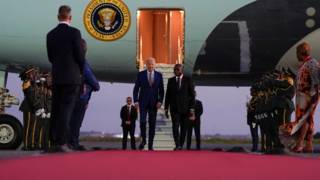

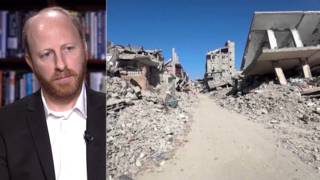
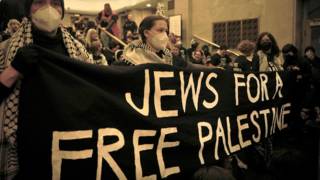





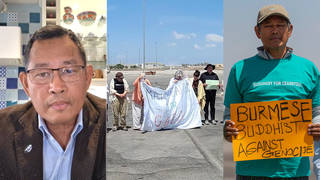
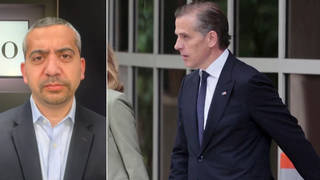
Media Options